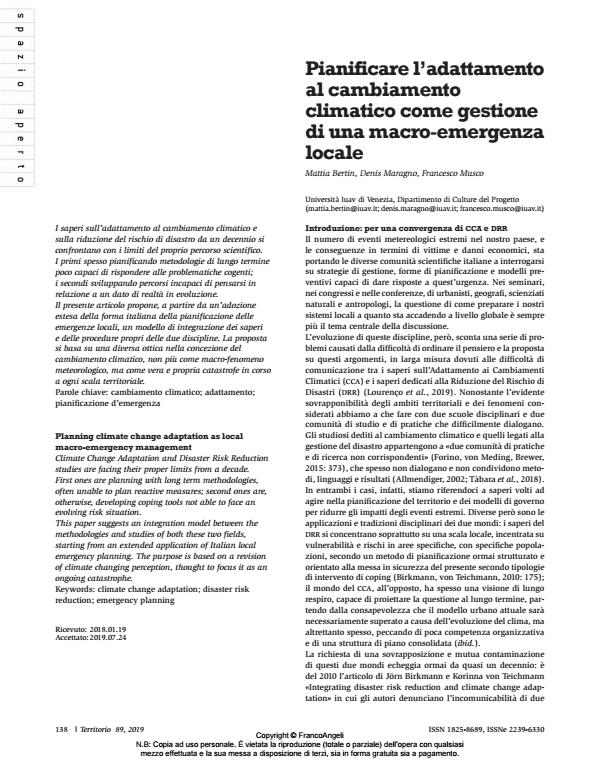Pianificare l’adattamento al cambiamento climatico come gestione di una macro-emergenza locale
Titolo Rivista TERRITORIO
Autori/Curatori Mattia Bertin, Denis Maragno, Francesco Musco
Anno di pubblicazione 2019 Fascicolo 2019/89
Lingua Italiano Numero pagine 7 P. 138-144 Dimensione file 242 KB
DOI 10.3280/TR2019-089018
Il DOI è il codice a barre della proprietà intellettuale: per saperne di più
clicca qui
Qui sotto puoi vedere in anteprima la prima pagina di questo articolo.
Se questo articolo ti interessa, lo puoi acquistare (e scaricare in formato pdf) seguendo le facili indicazioni per acquistare il download credit. Acquista Download Credits per scaricare questo Articolo in formato PDF

FrancoAngeli è membro della Publishers International Linking Association, Inc (PILA), associazione indipendente e non profit per facilitare (attraverso i servizi tecnologici implementati da CrossRef.org) l’accesso degli studiosi ai contenuti digitali nelle pubblicazioni professionali e scientifiche.
I saperi sull’adattamento al cambiamento climatico e sulla riduzione del rischio di disastro da un decennio si confrontano con i limiti del proprio percorso scientifico. I primi spesso pianificando metodologie di lungo termine poco capaci di rispondere alle problematiche cogenti; i secondi sviluppando percorsi incapaci di pensarsi in relazione a un dato di realtà in evoluzione. Il presente articolo propone, a partire da un’adozione estesa della forma italiana della pianificazione delle emergenze locali, un modello di integrazione dei saperi e delle procedure propri delle due discipline. La proposta si basa su una diversa ottica nella concezione del cambiamento climatico, non più come macro-fenomeno meteorologico, ma come vera e propria catastrofe in corso a ogni scala territoriale.
Parole chiave:Cambiamento climatico; adattamento; pianificazione d’emergenza
- New Metropolitan Perspectives Kevin Santus, Emilia Corradi, Monica Lavagna, Ilaria Valente, pp.1621 (ISBN:978-3-031-06824-9)
- Eco-Zip: Climate-Proofing an International Logistic Hub Mattia Bertin, Eugenia Vincenti, in Sustainability /2024 pp.2053
DOI: 10.3390/su16052053 - Innovation in Urban and Regional Planning Ginevra Balletto, Luigi Mundula, Alessandra Milesi, Mara Ladu, pp.329 (ISBN:978-3-030-68823-3)
- Computational Science and Its Applications – ICCSA 2020 Ginevra Balletto, Luigi Mundula, Alessandra Milesi, Mara Ladu, pp.441 (ISBN:978-3-030-58819-9)
- A Method for the Definition of Local Vulnerability Domains to Climate Change and Relate Mapping. Two Case Studies in Southern Italy Mauro Francini, Lucia Chieffallo, Annunziata Palermo, Maria Francesca Viapiana, in Sustainability /2020 pp.9454
DOI: 10.3390/su12229454
Mattia Bertin, Denis Maragno, Francesco Musco, Pianificare l’adattamento al cambiamento climatico come gestione di una macro-emergenza locale in "TERRITORIO" 89/2019, pp 138-144, DOI: 10.3280/TR2019-089018